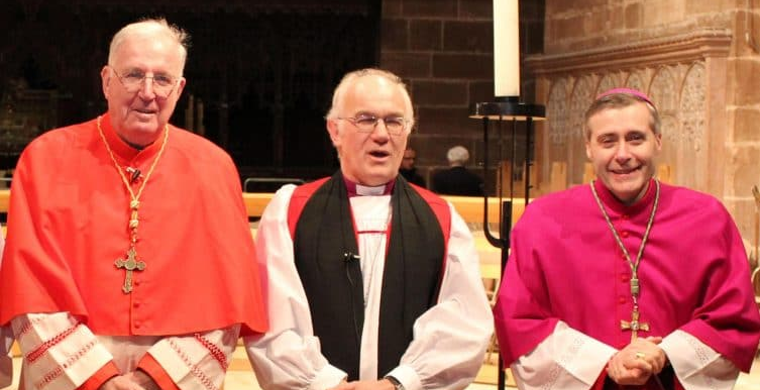The Conversion of Evangelical Bishops to Rome-A Diagnosis
By Gavin Ashenden
First published In the Catholic Herald
February 7, 2022
Peter Forster, who retired from his post as the Anglican bishop of Chester in 2019, has been received into the Roman Catholic Church.
Although the news has only just broken, it happened discreetly last year. I was told privately at the time by a mutual friend, who said that Peter didn't want any publicity. He had retired to Scotland and quietly sought reconciliation.
With Fr Michael Nazir-Ali, Jonathan Goodall and John Goddard, that makes four Church of England bishops who in the last year have abandoned Anglicanism and asked to be reconciled to the mother church.
Some people will look at the tally of converts growing and simply be grateful that such people of proven spiritual calibre have set aside the tragic schism that wounded the body of Christ in these islands and the process of their reconversion.
But it is not as simple as the numbers growing. John Goddard (who converted in 2014) and Jonathan Goodall were already steeped in Catholic spirituality and allegiance. Their move might have been painful in leaving life-long friends and communities behind, beleaguered in an increasingly secularised Church of England but Michael Nazir-Ali and Peter Forster were seasoned evangelicals rooted in a robust Protestantism.
Ten years ago, if you had even raised the possibility that two such prominent evangelical bishops might become Roman Catholic on setting down their formal responsibilities, people would have laughed. It would have seemed frankly impossible.
What has drawn such men of distinction to travel such a theological distance?
The answer requires us to shift our gaze from five-hundred-year-old theological disputes to the spiritual conflict of the twenty-first century.
An entirely new reconfiguration of spiritual and theological fault lines is developing. It has little to do with the Reformation struggles of works v grace, nor the inability to see the connection between the acorn of the New Testament and the mature growth of the ecclesial oak that sprung from it.
The issue of our age is the clash between political revolution and spiritual revolution; the political ethics of power and the spiritual ethics of conversion; between the thrust for socialist equality and the salvation of the soul; between humans as members of advantaged and disadvantaged groups, and individuals made in the image and likeness of God; between the judgment of progressive history in time and the judgment of Jesus at the end of time.
Peter Forster was a determined supporter of feminism. It was he who was d to appoint a woman as assistant bishop. But he was no supporter of up-ending the definition of marriage. So it must have come to him as a shock to discover that the trojan horse of feminism contained within it the shock troops of relativism, who would demand the legitimisation of the marriage of same-sex couples.
And the shock would have deepened when second-wave feminism morphed into the third wave. And suddenly, sex would give way to gender, which would become fluid and give both to the new thought crime of transphobia.
Evangelicals of Forster's generation were always alive to the primacy of the Holy Spirit. They believed in the miraculous conversion of the heart and the rebirth of the soul. But to their dismay, the generation that followed would find progressive identity politics more compelling than repentance and would exchange salvation for social revolution.
They watched with dismay as vocations morphed into quotas to impose diversity.
As the Church of England increasingly embraced the mantra of D.I.E (diversity, inclusion and equality), Peter Forster, Michael Nazir Ali and Jonathan Goodall saw that only the fidelity of the Roman Church stood between them and the collapse of Christian culture.
The power and vivacity of lived Catholic tradition has become the antidote to the perversity of progressive political ambition.
The Catholic Church is fighting the same battle as the Anglicans fought. It was the shock of watching the Church of England give way in that struggle that has drawn so many Anglicans to reconsider the claims of the Catholic Church and discover them to be true.
Whatever comes from pursuing the Synodal Path that has so recently been launched, we would do well not to lose sight of the fact that it was the promotion of a Synodal path that led to the Church of England becoming so porous to the spirit of the age and to its exchanging its spiritual wealth for a mess of political pottage.
The flow of Anglican refugees has only just begun.














